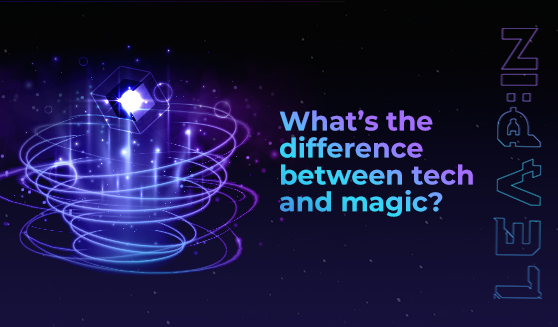

What’s the difference between tech and magic?

Welcome to the 553 new techies who have joined us. If you haven’t already, subscribe and join our community in receiving weekly tech insights, updates, and interviews with industry experts straight to your inbox.
This week we’re quoting Arthur C. Clark (Very Famous Sci-Fi Author)
What Clark said:
“Any sufficiently advanced technology is indistinguishable from magic.”
When did he say this?
In 1973, in his book Profiles of the Future: An Enquiry into the Limits of the Possible.
We love this book.
Because we love the idea of looking beyond what’s currently accepted as possible (or not), and exploring the potential of humanity to create things that do very much resemble magic.
While we were talking amongst ourselves about whether tech and magic are really very different from each other, one of the LEAP team described the first time she saw a smart pen in action.
“My brother-in-law came in with this notebook and pen,” she said, “and he started writing on the paper, then he showed me his laptop screen and what he’d written on the paper had appeared on the screen. I was mind-blown – it was like something out of Harry Potter.”
And haven’t we all had experiences like this? The first time you get up close to a novel technology, it really can feel like encountering magic.
So what’s the difference?
This got us thinking about why we don’t use the word ‘magic’ to describe technology. What’s the difference between tech and magic?
The generally accepted thinking is that technology and magic have different fundamental natures. Technology is based on scientific principles and laws of physics that are knowable – they can be understood through study, research and effort.
Magic, on the other hand, is unknowable – it defies scientific laws and operates on principles that can’t be explained.
Technology is developed through the creation and manipulation of tools, machines, and systems, using scientific knowledge. And even the most advanced and complex tech follows predictable rules and patterns that can be replicated and improved upon – as Chad Orzel wrote for Forbes.
This stands in contrast to magic: which is mysterious, a part of our world beyond our knowledge or control, and not restricted by science or rationality. It doesn’t have to be replicable. It doesn’t have to make sense.
But some technologies that now have a real presence in our lives would once have been confined to the realm of imagination and magic. So then…when does magic become tech?

It’s a process of knowledge building on knowledge
This is where we think the distinction really lies. Tech builds on itself – with one innovation leading to another, or one discovery laying the foundations for more knowledge.
This is different from magic – which is often portrayed as coming about via sudden mystical experiences or revelations, instead of cumulative knowledge creating greater and greater understanding and innovation.
And that’s why we’re constantly talking about how important knowledge-sharing is to the future of tech; because if we don’t share knowledge, we can’t build on that knowledge in order to reach new ideas.
If everyone says it’s a magical fantasy, then maybe (just maybe) it’s an idea worth pursuing
Arthur C. Clark also wrote,
“Every revolutionary idea seems to evoke three stages of reaction. They may be summed up by the phrases:
(1) It’s completely impossible. (2) It’s possible, but it’s not worth doing. (3) I said it was a good idea all along.”
He was right, wasn’t he? We’ve seen these three phases play out in the tech industry time and time again. Wherever there is great scepticism and doubt, there is also great potential.
You tell us…
We want to know what you think. How would you define the difference between tech and magic? Open this newsletter on LinkedIn and tell us in the comment section. We’ll see you there.
Have an idea for a topic you'd like us to cover? We're eager to hear it! Drop us a message and share your thoughts.
Catch you next week,
Richard McKeon
Group Marketing Director
Mark your calendars for 📅 10-13 February 2025.





